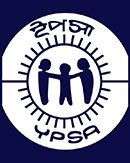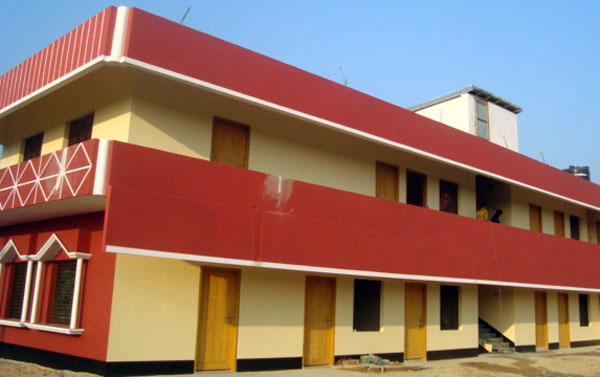Project Title:
YES Centre (Youth Empowerment through Skills in Bangladesh)
Implemented by:
HOPE’87-Bangladesh and Young Power in Social Action (YPSA)
Supported by:
YOU Foundation- Education for Children in Need , UNESCO Special Ambassador Ms. Dr. Ute Henriette Ohoven
Project justification:
More then 50% of the Bangladesh population of 158 million is under the age of 24. Youth is the hope of the Nation for the future. Young people are the most energetic and productive segment of the total population. Youth is certainly a most crucial and critical phase of life. A vast majority of this section unfortunately remains unreached, but it is a matter of fact that young people need a great amount of concentration to become the driving force of a Nation. They are facing lots of challenges in Bangladesh. They don’t receive specific direction, guidance and motivation for their future development. They are unable to take decisions about their lives, communities and workplaces. Their families demand from them to earn money and to contribute to the family income. However those young people and especially the girls and young women don’t have enough options for skills development training and in the same way encounter quite substantial difficulties in finding work and employment. This means, that a new social generation needs to be integrated into society as responsible citizens, knowing about their rights and duties.
In Bangladesh women are confined to the domestic domain, that includes homestead unpaid jobs. Women’s involvement is mainly in the non-productive and non-monetized sector while men’s involvement is in the formal, productive and monetized sector. Girls and young women typically earn less and work in more unstable jobs and have neither access to resources nor market driven skills, a situation that prevents them to develop entrepreneurial skills or to have a decent job. Key issues like violence, sexual harassment, discrimination, early marriage, malnutrition, health crises, drop out from education add to the unequal access to economic structures. Women hardly have a voice in the decision making process. Parents often are not willing to let girls travel long distances to go to school and to work, fearing for them being harmed. Opportunities for skills development to become self-reliant are scarce.
Lack of employment opportunities, market driven education and access to resources prevent young women from participating in the economic development process and to contribute to alleviate poverty.
Huge potentialities are being neglected in this regard. Due to societal conservativeness, this situation is even worse in the Cox’s Bazar district, located in the very South-East part of Bangladesh.
Furthermore, Bangladesh’s geographical location, its topography, the nature of its economy, rapid urbanization and high population levels make it vulnerable to natural and human induced disasters.
Natural disasters that repeatedly affect Bangladesh include: earthquakes, floods, landslides, cyclones. In addition, the country is affected by industrial disasters, disease epidemics, fires, accidents (road, rail, and air), and civil and military armed conflict. Such calamities killed thousands and cost millions by destroying large-scale infrastructure, housing, livestock, agriculture, equipment, other assets and livelihoods. The effects of these disasters are exacerbated by poor infrastructure, scant emergency response services and high levels of poverty, particularly in rural areas lowering coping mechanisms at all levels. The most affected are the vulnerable groups including women, children, elderly and the disabled; this is in part due to the lack of support services available for these groups.
Economic empowerment of youth, especially of girls and young women, with a particular scope of decent employment is the key way to confront gender-based discrimination and violence, a fact that YPSA and HOPE’87 learnt during implementation of several women-centered projects in different parts of Bangladesh. To combat the trend of structural discrimination, YPSA and HOPE’87-Bangladesh strive to increase the knowledge, skills, confidence and financial assets of youth, especially of girls and young women, by empowering them through developing their capacities and increase their access to economic activities, as a substantial contribution to poverty reduction.
Overall Goal:
- Empower youth, especially girls and young women, by strengthening their skills and voices for economic self-reliance to take a leadership role in poverty alleviation initiatives in Cox’s Bazar district and Dhaka.
Specific Objectives
- Develop skills and access to information and technology for increasing productivity among young people in Cox’s Bazar and Dhaka district
- Support the access to office management skills to promote decent employment opportunities to improve economic self-reliance among young people in Cox’s Bazar and Dhaka district
- Strengthen school-based DP / DRR approaches
Target groups
The direct target group of this project are 400 youth people among them 60% girls and young women. The age range of the target groups is approx. 15 – 22 years with a minimum of accomplished class nine to graduate in school and college. The indirect target beneficiaries of this project are 2,430 family members.
Project Location:
YES CENTER, Village- Paner Chara, Union – South Mithachari, Upazilla- Ramu, District – Cox’s Bazar, Bangladesh (selected courses will also be offered in Dhaka)
Project Duration:
2 years (July 2016 to June 2018)
Expected result of the project
- Life skills for 400 youth (60% girls and young women) are enhanced
- 400 youth gained market driven skills to improve their economic self-reliance
- 5 girls of graduates are equipped with laptop, internet modem and bicycles for running a “Mobile Internet Shops” (“ICT on Wheels”) as a tool of self-employment
- The possibility of 400 young people to enter successfully the job market or to sell their skills or to pursue education/training at advanced schools or universities are enhanced.
- Trainees are ready to act as Change Agents regarding DP and DRR
Major activities planned
- Adapt and equip the current training venue
- Conduct a training needs assessment
- Select potential participants for training
- Provide life-skills development trainings
- Provide management skills trainings: The target groups will receive 6 types of separate trainings as follows
- ICT (Computer) training
- English language course
- Hotel Management Course
- Tourist guide courses
- Office management and secretarial course
- Basic accountancy & bookkeeping
- Provide community based DRR trainings
- Provide small grant as startup capital
- Arrange Job Fair
- Organize structured round-table meetings
- Organize advocacy campaigns
- Provide a small blogger training
- Conduct regular coordination, monitoring as well as mid-term and end-of-project evaluation
Sustainable Development Goals (SDGs) supported by the project

Event news
 YPSA YES Center launched Pre-Vocational Course in Cox’s Bazar
YPSA YES Center launched Pre-Vocational Course in Cox’s Bazar World Skills Day 2021 celebrated in Cox’s Bazar
World Skills Day 2021 celebrated in Cox’s Bazar Project Inception of USAIDS’s Youth Entrepreneurship and Empowerment Support (YES) held at Cox’s Bazar
Project Inception of USAIDS’s Youth Entrepreneurship and Empowerment Support (YES) held at Cox’s Bazar YES Center organized Disaster Risk Reduction training for the school students
YES Center organized Disaster Risk Reduction training for the school students Life Skills Training held at YES CENTER, Ramu, Cox’s Bazar
Life Skills Training held at YES CENTER, Ramu, Cox’s Bazar Management training for new batch started at YES Center Cox’s Bazar
Management training for new batch started at YES Center Cox’s Bazar- ICT Training of 7th and 8th Batch started at YES Center CoxsBazar
 Inaugural Ceremony of “YES center-Youth Empowerment through Skills” held at Ramu, Cox’s Bazar
Inaugural Ceremony of “YES center-Youth Empowerment through Skills” held at Ramu, Cox’s Bazar

